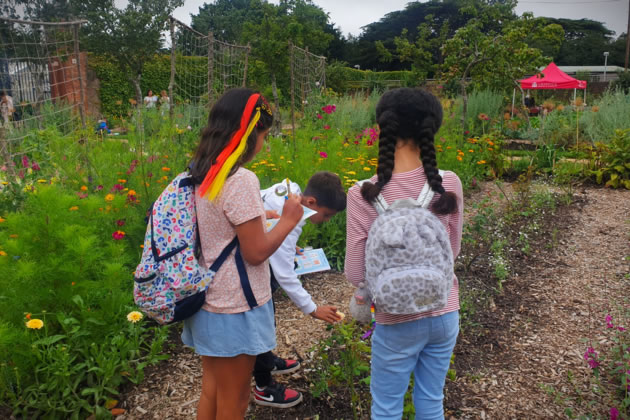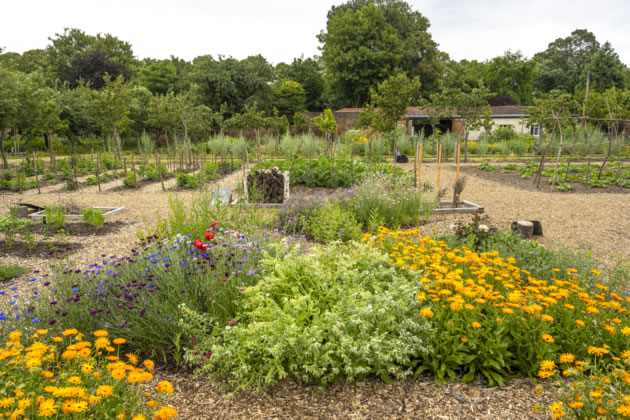Free Nature Trails at Chiswick House Gardens
Designed to highlight the biodiversity of the Kitchen Garden

Pick up a free trail map and booklet to explore the Kitchen Garden
August 13, 2024
For the rest of the summer a serious of free nature trails are being held at Chiswick House. These are designed to highlight the biodiversity of the Kitchen Garden, raise awareness about the ways this is achieved (from “no dig” techniques to no-kill pest control), and get local families involved in exploring nature.
From Thursdays to Sundays, visiting children and adults can pick up a free trail map and booklet to explore the Kitchen Garden, designed by local artist Jaixia Blue, who is also working with on the Black Chiswick through History project at Chiswick House.
The Arts Council England funded booklets encourage children to engage with insect life in the garden, finding out about the importance of pollinators, and discovering some of the different flower, fruits and vegetable sections of the garden.
After starting the trail with a game of “Flower Bingo”, participants can look for bumblebees and black fly (both important pollinators), take time out to relax and find stillness in the garden’s beautiful meadow, and finally visit the edible Tea Garden to pick a small number of flowers of their own to take home and press.
The “Flower Feast” trail will be available to take part in throughout the summer.
Dating back to the 17th-century, the walled Kitchen Garden at Chiswick House is home to a rich array of flowers, fruit and vegetables, grown using organic principles and tended to by staff, volunteers and members of the local community.
It’s also a good place for children to find out more about invertebrates and the importance of biodiversity, thanks to the innovative ways the Kitchen Garden team work with nature, rather than against it.
For example, while traditional gardening and food production methods often treat insects as something of a menace, eradicating them with environmentally-damaging pesticides, the gardeners at Chiswick House employ “no kill” methods instead.
One of these is to grow sacrificial companion plants like nasturtium next to food crops. The gardeners find that creatures like aphids and caterpillars that would otherwise feed on the growing vegetables are drawn to the nasturtium instead, thereby minimising their impact on the crops.

The Kitchen Garden is home to a rich array of flowers, fruit and vegetables
The Chiswick House team also use an innovative “no dig” method, to benefit soil health and structure and improve the garden’s biodiversity.
Traditional digging techniques can prove surprisingly harmful, destroying vital fungal networks, obliterating drainage channels created by worms, and releasing carbon that would otherwise be trapped in the earth.
In contrast, “no dig” methods create soil that contains more beneficial plant nutrients, better able to support the microbes, worms and insects that live within it.
Finally, the garden is also home to a number of “habitat stacks” made from logs and designed to provide shelter and warm spaces for animals like beetles and centipedes.
Combined, these practices have helped create a truly biodiverse space, home to nectar-drinking bees, butterflies and moths, as well as flies, spiders, ladybirds and woodlice.
Rosie Fyles, Head of Gardens at Chiswick House & Gardens, said, “From our no dig policy, to no-kill pest control methods, we’re proud to do things differently in the Chiswick House Kitchen Garden. The environmentally-friendly methods we employ here have helped make the garden a haven for nature and people, an important growing space and a valuable community resource.
“We hope that this year’s garden trail inspires you to take time to enjoy the garden, discover the fascinating invertebrates that can be found here, and find out more about how the right gardening methods can boost biodiversity and help protect wildlife, working with nature rather than against it.”
This page is sponsored by West London Queer Project who support community initiatives in Chiswick.
